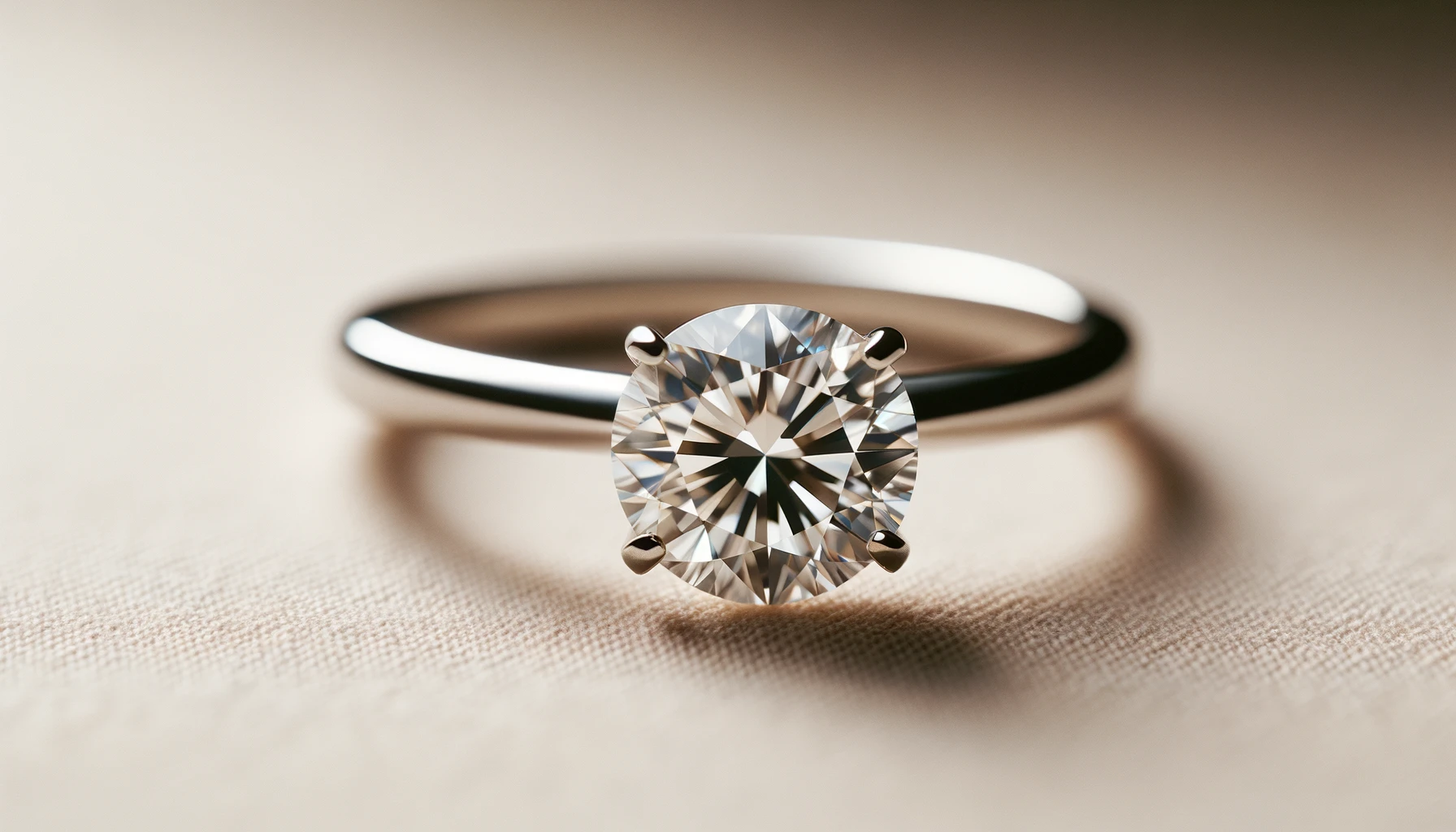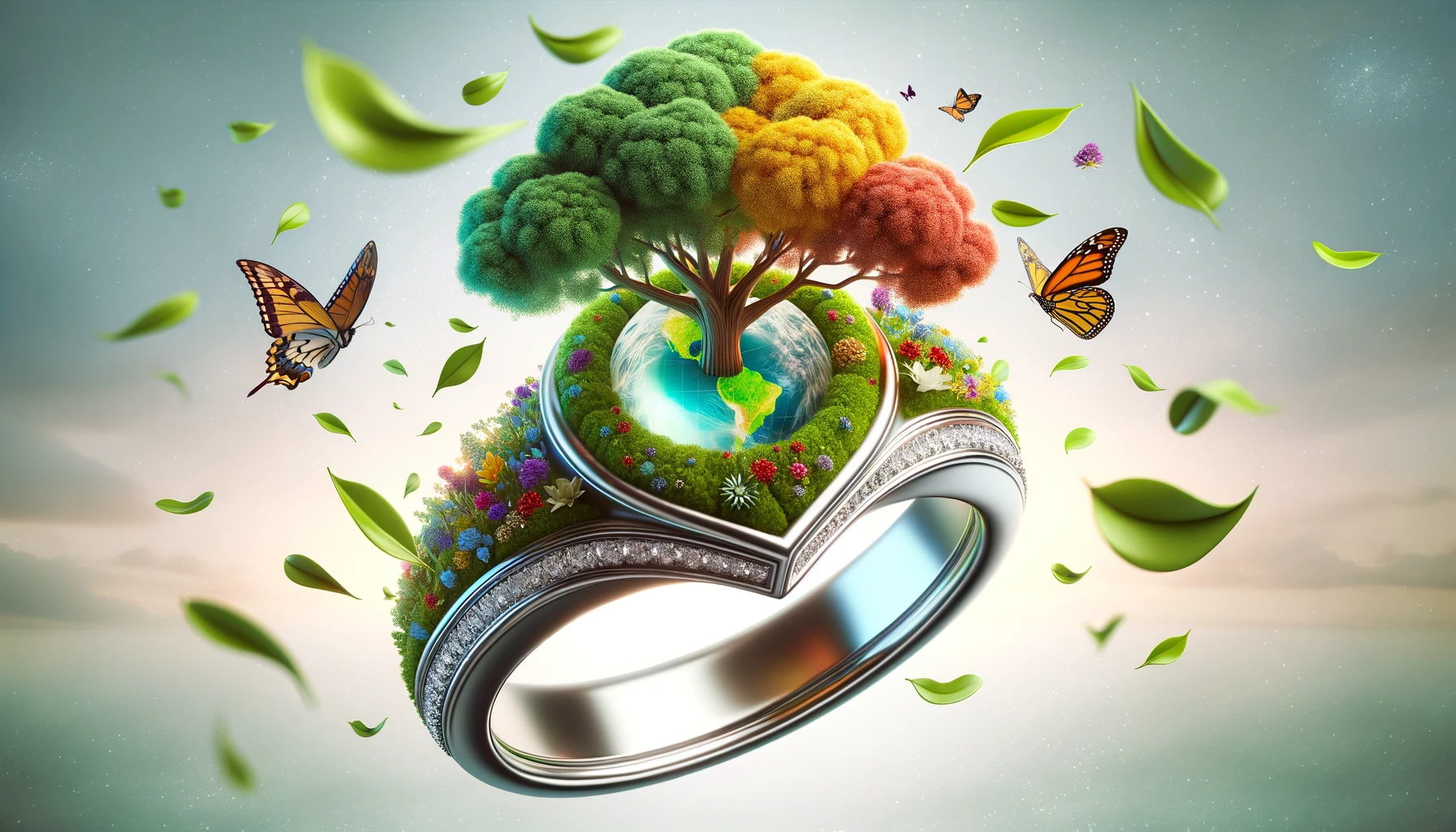





These diamonds and gemstones are sourced from mines that adhere to strict labor and environmental standards.
By choosing an ethical engagement ring, you can be sure that your purchase is not contributing to human rights abuses or environmental degradation.
Ethical engagement rings are often made using sustainably sourced materials.
This means that the diamonds and gemstones are mined in a way that minimizes the impact on the environment.
Additionally, the workers involved in the mining process are treated fairly and paid a fair wage.
Another important aspect of ethical engagement rings is fair trade practices.
This ensures that the workers involved in the production of the rings are paid fair wages and work in safe conditions.
By choosing an ethical engagement ring, you are supporting the livelihoods of these workers and helping to create a more equitable industry.

These diamonds are created in a laboratory using advanced technology that replicates the natural diamond-growing process.
Lab-grown diamonds are chemically and physically identical to mined diamonds, but they are produced without the environmental and social impact of traditional mining.
Moissanite is another ethical gemstone option.
It is a lab-grown gemstone that closely resembles a diamond in appearance.
Moissanite is a durable and affordable alternative to diamonds, making it a popular choice for ethical engagement rings.
Sapphires are also a great choice for ethical engagement rings.
These gemstones are often sourced from mines that adhere to strict labor and environmental standards.
Sapphires come in a variety of colors, allowing you to choose a unique and meaningful stone for your engagement ring.
When purchasing an ethical gemstone, it is important to ensure its authenticity.
Look for certifications from reputable organizations that guarantee the ethical and sustainable sourcing of the gemstone.
Additionally, consider working with a trusted jeweler who specializes in ethical engagement rings to ensure that you are getting a genuine and ethically sourced gemstone.
| Gemstone | Description | |
|---|---|---|
 |
Diamond | A popular choice for engagement rings, diamonds are known for their durability and brilliance. |
 |
Emerald | Emeralds are known for their vibrant green color and are often associated with luxury and elegance. |
 |
Sapphire | Sapphires come in a variety of colors, but the most popular is blue. They are durable and symbolize loyalty and trust. |
 |
Ruby | Rubies are known for their deep red color and are often associated with passion and love. |
 |
Moissanite | Moissanite is a lab-created gemstone that closely resembles a diamond. It is a more affordable and ethical alternative. |
These options not only ensure that the ring is made with sustainable materials, but also support fair labor practices and minimize environmental impact.
If you're considering an ethical engagement ring, here are some of the metal options you can explore:Recycled MetalsOne popular choice for ethical engagement rings is recycled metals.
These metals are sourced from old jewelry, industrial byproducts, and electronic waste, which are then refined and transformed into new pieces.
By choosing recycled metals, you're reducing the demand for newly mined materials and minimizing the need for environmentally damaging mining practices.Fair Trade GoldAnother ethical metal option is fair trade gold.

Fair trade gold is mined and produced with strict social and environmental standards.
It ensures that miners receive fair wages, work in safe conditions, and that the mining practices are environmentally responsible.
By choosing fair trade gold, you're supporting sustainable mining communities and promoting ethical practices in the jewelry industry.
By opting for an ethical ring, you're supporting various initiatives and causes that aim to create a more sustainable and fair jewellery industry.
When you choose an ethical engagement ring, you're supporting fair labour practices and ensuring that the workers involved in the production process are treated ethically.
This includes fair wages, safe working conditions, and the absence of child labor.
By supporting ethical practices, you're contributing to the well-being of workers in the jewellery industry.
Traditional mining practices can have a devastating impact on the environment, including deforestation, water pollution, and habitat destruction.
Ethical engagement rings, on the other hand, are made with materials that are sourced and produced using environmentally responsible methods.
By choosing an ethical ring, you're minimizing the negative environmental impact associated with traditional mining.
Before making a purchase, take the time to research and educate yourself about ethical engagement rings. Learn about the different certifications and standards, such as Fairtrade Gold and the Responsible Jewellery Council, that ensure the ethical sourcing and production of jewelry.
Find jewelers who specialize in ethical engagement rings.
These jewelers are committed to sourcing and producing jewelry in an ethical and sustainable manner.
Look for certifications or affiliations that indicate their commitment to ethical practices.
Another option is to consider vintage or antique engagement rings.
By choosing a pre-owned ring, you're giving it a new life and reducing the demand for newly mined materials.
Vintage and antique rings often have unique designs and can be a more sustainable choice.
An engagement ring is considered ethical when it is sourced and produced in a way that minimizes harm to people and the environment. This includes ensuring fair labor practices, using conflict-free and responsibly sourced gemstones or diamonds, and reducing the ecological footprint of the mining and manufacturing processes.
To choose an ethical engagement ring, consider the following factors:
1. Ethical sourcing: Look for rings made from recycled metals or those that use ethically sourced materials.
2. Conflict-free diamonds: Opt for diamonds that are certified as conflict-free, meaning they are not associated with human rights abuses or funding conflicts.
3. Fair labor practices: Choose brands that prioritize fair wages and safe working conditions for their employees.
4. Sustainability: Look for rings that are made using environmentally friendly practices and materials.
5. Transparent supply chain: Select brands that provide information about the origin of their materials and the production process.
To determine if a ring is ethically sourced, you can:
1. Research the brand: Look for information about the brand's commitment to ethical sourcing and sustainability on their website or through independent certifications.
2. Check for certifications: Look for certifications such as the Kimberley Process Certification Scheme for diamonds, which ensures they are conflict-free.
3. Ask questions: Reach out to the jeweler or brand and ask about their sourcing practices, including where they obtain their materials and if they have any certifications or third-party audits.
4. Look for transparency: Ethical brands often provide transparency about their supply chain, including the origin of their materials and the steps taken to ensure ethical practices.
Ethically sourced diamonds are considered more ethical compared to diamonds that are associated with human rights abuses or funding conflicts.
However, it's important to note that the diamond industry is complex, and there are varying standards and definitions of what constitutes ethical sourcing.
Look for diamonds that are certified as conflict-free and ensure that the brand or jeweler can provide transparency about their sourcing practices.
Additionally, consider alternative options such as lab-grown diamonds or other gemstones that have a lower environmental and social impact.
True romance: discover the beauty of ethical wedding and engagement…
Blair and Sheridan are diamond jewellers who work with you…